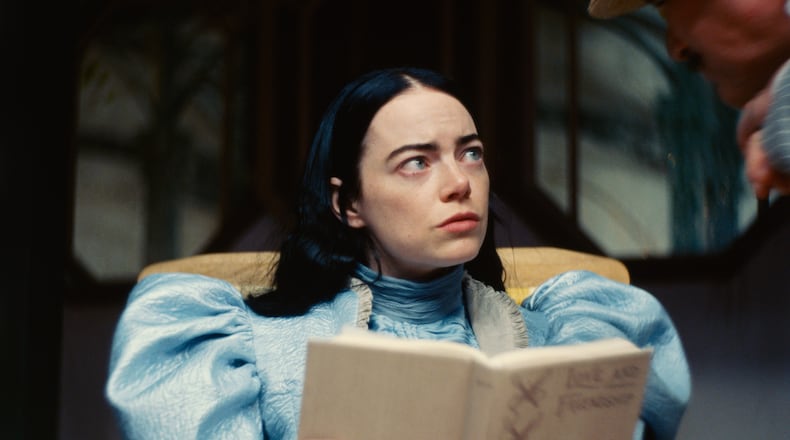It has been hard to miss the hype this year over two films made by respected filmmakers Martin Scorsese and Christopher Nolan. Scorsese’s story of murder and greed unleashed by the white community against the Osage nation in “Killers of the Flower Moon” and Nolan’s biopic on the father of the atomic bomb, “Oppenheimer,” have been at the top of many critics’ year-end lists. But both those films left me disappointed with their largely conventional storytelling and a failure to, as Marie Kondo might say, “spark joy.” Audiences may need to dig a little deeper this year to find the exceptional, less-hyped treasures and idiosyncratic stories that made this an exceptional year in film. Here are my top 10:
Credit: TNS
Credit: TNS
“Poor Things”
If you see one movie this year, make it Greek director Yorgos Lanthimos’ triumphant and devastatingly hilarious feminist spin on the Frankenstein story. Emma Stone in caterpillar black eyebrows and hair down to her thighs delivers a wonderfully unhinged, award-worthy performance as a young patient, Bella Baxter, who is an experimental guinea pig for her mad scientist father figure Dr. Godwin Baxter (a campy Willem Dafoe). Transformed by Baxter into an id-defined creature not yet colonized by feminine indoctrination, good behavior or self-control, Bella embarks on an orgiastic — and deliciously cathartic — bildungsroman of a kind we’ve rarely seen. Her sexual liberation is facilitated by a libertine rake, played with delicious, scenery-chewing mustache twirling by Mark Ruffalo, who finds his own doctrine of sexual freedom challenged by Bella’s unfettered one-upmanship. As visually audacious as it is genre-busting, “Poor Things” is like a jug of cold water thrown on your face: jolting, invigorating and absolutely unexpected with every twist and turn. Here’s hoping Stone won’t be robbed of her rightful Oscar the way Cate Blanchett, as another deeply unconventional woman, was of hers for “Tár.” In theaters now.
Credit: TNS
Credit: TNS
“Barbie”
Not exactly a sleeper, this pink juggernaut and cultural phenomenon with a surprising depth unexpectedly reanimated the movie industry from its post-pandemic slumber. Director Greta Gerwig’s story of the philosophical reawakening of a plastic Mattel toy delivered a laugh out loud, often arrestingly tender examination of the straight jacket of gender roles as dolls Barbie and Ken ventured into the “real” world and discovered men, not women, are actually the ones in control. That epiphany unleashes a brilliantly funny macho deep dive where Ken (Ryan Gosling) channels his inner Sylvester Stallone in a floor-grazing fur and fingerless gloves and attempts to create a dude version of Barbie world. Gosling owned his rock opera-meets-Gene Kelly dance numbers and brought oodles of pathos, neediness and unhinged bravado to his delightful turn as psychologically addled arm candy. The first billion-dollar film made by a woman director, “Barbie” will hopefully persuade Hollywood’s boys’ club that taking a chance on a female voice is actually a pretty safe bet. Available on Amazon Prime, YouTube, Apple TV and Google Play.
Credit: Chris Harris
Credit: Chris Harris
“All of Us Strangers”
A poignant, wonderfully ambiguous drama that moves between melodrama and supernatural fantasy, director Andrew Haigh’s “All of Us Strangers” feels like a fairy tale set, not in the world of children, but in the melancholy-laced kingdom of adults. Alone and isolated in a modern London apartment skyscraper, Adam (Andrew Scott) and Harry (Paul Mescal) are neighbors who appear to be the only occupants in their strangely depopulated twilight world. They bond over their solitude and become lovers but their relationship is complicated by the tug of Adam’s past. A 40-something screenwriter, Adam begins to break up his days at the keyboard by reconnecting with his parents in the London suburbs who he tells Harry died in a car accident when he was 12. Is he dreaming those reunions, is he rewriting his childhood and addressing all the things he wanted to ask his parents? Haigh keeps his audience guessing about the nature of the world he has created and the gossamer line between reality and imagination in this unconventionally told love story about both romantic love and the ache of familial love and the trauma when they fall away. Opens Dec. 22.
Credit: TNS
Credit: TNS
“Anatomy of a Fall”
Actress Sandra Hüller stars in two lauded films this year, “The Zone of Interest” and this twisty, cerebral courtroom drama from French director Justine Triet. The film is centered on a German writer, wife and mother Sandra (Hüller) who is accused of murdering her husband. The ensuing race to come up with her defense is jeopardized in a French courtroom where the decks are decidedly stacked against Sandra. French is not her native language but it’s the vernacular of the courtroom. Sandra is also an outsider and perhaps, more damningly, she is a frosty, brilliant, bisexual writer who doesn’t measure up to anyone’s vision of a victim. The couple’s visually impaired son plays a key role in his mother’s trial as the story unfolds in surprising ways and reveals how reality is truly in the eye of the beholder. This Palme d’or winner at the Cannes Film Festival is a nuanced look at the complexity of relationships of every stripe in both a marriage and a family. Expected to stream on Hulu in February.
Credit: TNS
Credit: TNS
“May December”
Purposefully over-the-top and as sudsy as a Lifetime movie or Brian De Palma thriller, Todd Haynes’ true crime melodrama is based on the real life ‘90s cause celebre of Seattle teacher Mary Kay Letourneau who at 34 had sex and then children with her 12-year-old student. Haynes’ very self-aware set up has a Letourneau-proxy Gracie (Julianne Moore) decades later living a seemingly happy family life with her former student Joe (Charles Melton) on the Georgia coast (the film was shot in Savannah). That tranquility — or maybe lethargy is the better word — is pierced by an intense, glamorous, self-serving New York actress Elizabeth (Natalie Portman) who will portray Gracie in a movie and wants insight into the character she is about to play. Her quandary: Is Gracie damaged or just manipulative and calculating? Elizabeth clearly longs to get under Gracie’s skin and understand her but Gracie remains a cipher throughout, offering access and then retreating behind a sphinx half smile. This Ingmar Bergman-reminiscent tale of two women playing very different roles in life has an undercurrent of mania that calls to mind the Hollywood melodramas of director Douglas Sirk, who has been a clear influence on Haynes throughout his career. Streaming on Netflix.
Credit: Jason McDonald/Netflix
Credit: Jason McDonald/Netflix
“Maestro”
Bradley Cooper’s long-awaited bio-picture of legendary composer and conductor Leonard Bernstein is a beautifully wrought tribute to a deeply complicated man and his equally multifaceted wife, Felicia Montealegre Cohn Bernstein (a captivating Carey Mulligan). Felicia’s life is often overshadowed and shaped by her husband’s talent but also by his many indiscretions as a gay man struggling to balance a desire for the warmth and stability of a family and his secret, erotic life. Too often these “great man” biopics make the wife an ancillary helpmate to genius but Cooper is savvy enough not to take that tack. The difficulty of being gay at this point in American history and also the reality of marriage with all its demands and cruelties are just some of this film’s many insights whose manifold complexity is in keeping with its subject. Opens Dec. 20 in theaters and streaming on Netflix.
Credit: TNS
Credit: TNS
“A Thousand and One”
First-time director A.V. Rockwell centers her imperfect but heartfelt drama about parenting and the love between a mother and her child on an unconventional heroine. Inez de la Paz (Teyana Taylor) is loud, abrasive and prone to conflict. Recently released from prison, she seeks out the son Terry (played at various ages by Aaron Kingsley Adetola, Aven Courtney and Josiah Cross) she left behind in foster care and kidnaps him to forge a new life for the two of them. In “A Thousand and One” Inez’s love for her son is also a kind of self-love. It’s an effort to rectify her own sad childhood in the foster care system marked by abandonment in this profound examination of the healing power of parental devotion set against the gentrification and racial profiling of New York City in the ‘90s that further traumatizes people like Inez and Terry. Available on Amazon Prime, Google Play, YouTube and Apple TV.
“Perfect Days”
When so much of success is measured in money and social standing, German director Wim Wenders’ “Perfect Days” feels like the perfect post-Covid reminder of the ordinary beauty of existence. Hirayama (Kôji Yakusho) is a middle-aged Tokyo janitor whose job cleaning public toilets is one of society’s most degraded. And yet he goes about it with unbridled gusto, meticulous in making his work cleaning up other people’s messes meaningful. He finds moments of beauty (most often in his fascination with trees — he nurtures an army of saplings in his small apartment) and connection in the course of an ordinary day. Wenders’ film is a reminder of the need to acknowledge and show respect to every human being no matter what their station in life. Opens in Atlanta theaters in 2024.
“The Taste of Things”
A meditative film from French-Vietnamese director Tràn Anh Hùng about the magical alchemy of cooking, this French film stars Juliette Binoche as Eugenie, a talented chef presiding over a kitchen bathed in honeyed light in the 19th century Loire Valley. The focus for the majority of the film is on the hypnotic choreography of cooking, of making sauces and stocks, braising and poaching, and the well-timed ballet of bringing a meal to the table. Her partner in food is a fellow gourmand Dodin (Benoît Magimel). As in “Perfect Days,” “The Taste of Things” is a study in the pleasures of a life well-lived and the dignity in work well done. The film is a uniquely seductive, sensory tribute to the care and art of cooking and would make a lovely companion piece to “Menus-Plaisirs - Les Troisgros,” the equally insightful peek into the art of food from documentary legend Frederick Wiseman about a real-life French food dynasty. Opens Feb. 9.
Credit: Handout
Credit: Handout
“The Zone of Interest”
Jonathan Glazer created one of the most memorable, distinctive movies of 2013, the surreal, shapeshifting psychological science fiction film “Under the Skin.” Fans of that feature may be initially discombobulated by “The Zone of Interest,” a remarkably placid, subtle film that centers on a happy, middle-class German family whose paterfamilias Rudolf Höss (Christian Friedel) has his “dream” job as the commandant of Auschwitz. Rudolf and his equally sinister wife Hedwig (Sandra Hüller) live in a kind of bucolic “Blue Velvet” paradise of flowers, adorable children, swimming pool and a steady stream of lingerie, fur coats and other riches flowing to their doorstep from the concentration camp next door. The film is reminiscent of the work of Austrian director Michael Haneke in reminding us of our own complicity in the injustices of modern life. It’s hard not to think while watching this disturbing story of the kind of juxtapositions that transcend history or geography and how all of us go about our daily routine willfully blind to the wrongs that unfold just outside of own tall walls. Opens Jan. 19.
Felicia Feaster is a longtime film critic and the co-founder of the 34-member Atlanta Film Critics Circle. She holds a graduate degree in film studies from Emory University and is the author of the book Forbidden Fruit: The Golden Age of the Exploitation Film.
About the Author
Keep Reading
The Latest
Featured










